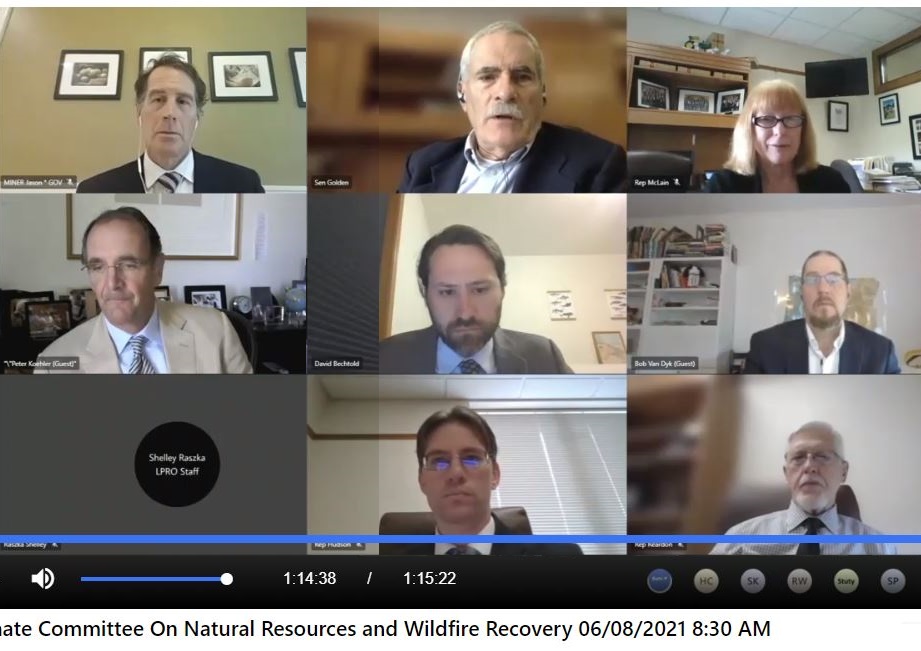Collaborative effort could affect forestry practices across 10 million acres in Oregon
6 min read
Collaboration efforts are on track, participants reported to legislators just before the close of the 2021 session.
Timber and environmental groups are collaborating in an unprecedented attempt to agree on new forestry practices. The outcome could affect 10 million acres in Oregon. Just before closing the 2021 session, legislators heard a status update. Senator Jeff Golden.
Sen. Golden: [00:00:07] Senate Bill 1602, requires a joint legislative informational hearing be held during the 2021 legislative session regarding the structure and status of the mediation sessions. That’s exactly why we’re here today and I guess I will just add that many of us see this as a really important initiative, with a potential of easing tension and conflict that has been costly to Oregon for decades now.
So with that, let me introduce the four panelists we have with us today. They are Jason Minor of the Governor’s office; Peter Koehler, a mediator for this process; David Bechtold from Northwest Resource Law and Bob van Dyke from the Wild Salmon Center.
Thank you for supporting
local citizen journalism
Jason Minor: [00:01:00] Thank you, Chair Golden. Thank you, Chair Hudson. Thank you, members of the Committee, for hearing from us this morning. For the record, my name is Jason Minor. I serve as the governor’s Natural Resources Policy Director…
The focus of what we’re here to discuss today is the commitment of both parties to work together in collaboration, through a mediated process to discuss changes to the Forest Practices Act and the process that might govern those. I’ve learned a lot through working with the individuals, with all of the forest products industry and the environmental community, towards a vision for the Forest Practices Act, and a vision for updating the Forest Practices Act, that I think is more collaborative than many of the processes in which I participated over the past 20 years.
The governor is inspired by this process, inspired by the people participating in it. And maybe again, a reflection on history. I know that in a conversation last year that [00:02:00] she had with Governor Barbara Roberts, Governor Barbara Roberts reflected how impressive it was that this group has come together in the MOU and set about this very hard, but very meaningful work.
Thank you for your donation to support local citizen journalism
publicnewspapers.org
Sen. Golden: [00:02:11] Thank you. Mr. Koehler. Welcome.
Peter Koehler: [00:02:12] Thank you. And good morning, senators and representatives. Uh, my name is indeed Peter Koehler, and I am serving as the mediator in this negotiated process. Just briefly about me, I’m a professional mediator and arbitrator after 32 years of practicing law, both as a trial lawyer, and then as in-house counsel for Nike.
At this point, we are treating the substance of our negotiations as confidential. Parties and state agency personnel have signed confidentiality agreements, and this is important in my view. And I think this is true of most mediations because the parties need to be as candid [00:03:00] as they possibly can be.
Once we land on a proposed agreement, which we hope to do by the end of this calendar year, we will socialize with key stakeholders, broader industry, the broader environmental community, our tribal partners, and the public at large.
So, the big question: How are things going? And I would say we are making progress. I liken it to painting a house. And I would say that in the first few months of this process, we’ve been doing a lot of, cleaning and sanding and scraping and, getting ready to apply the paint.
I want to let you know that all parties are seriously engaged in this process. We consider this critically important work on behalf of the industry, on behalf of our environmental community, and on behalf of the entire state of Oregon, and we’re committed to get it done.
Sen. Golden: [00:03:59] I wanted to thank you, Mr. Koehler, and welcome Mr. Bechtold.
David Bechtold: [00:04:03] Thank you, Chair Golden and Chair Hudson for making time today. My name is David Bechtold and I have been retained by the 12 forest product sector companies and the Oregon Small Woodlands Association to facilitate their participation in the private forest court process.
In 1971, Oregon was the first state to pass an Oregon Forest Practices Act. And because it has been continually amended in light of our scientific understandings, our Forest Practice Act remains one of the most protective such laws in the United States. The possibilities ahead to further refine the Forest Practices Act are enormous. And because of these possibilities, the private forest accord, it is one of the highest priorities for each of the companies that signed the agreement.
The habitat conservation plan that is the goal of the private forest accord, will cover approximately nine to 10 million acres of private lands across the state. If successful, conservation measures for salmon, steelhead and other aquatic resources will be applied on private lands in essentially every drainage basin in Oregon. [00:05:00] This will be a voluntary conservation commitment, the size of which Oregon has never seen. And there are a few other comparable examples anywhere else in the world.
And I do want to highlight the participation of OSWA. It’s not just large industrial forest landowners, but a swath of the forest product sector in Oregon.
Sen. Golden: [00:05:17] Mr. Bechtold, thank you very much. Mr. Van Dyk, I’d like to hear from you, please.
Bob Van Dyk: [00:05:23] Chair Golden, committee members, for the record, Bob van Dyke, I’m the Oregon Policy Director for Wild Salmon Center. Thank you for the opportunity to testify. I’m here to represent the 13 conservation and fishing organizations who signed the memorandum of understanding on private forest practices last year.
I’ll just say broadly, the MOU, it’s not a secret, identifies three top areas for discussion: stream buffers, steep slopes, and roads. So those are topics we’re discussing. But what’s really different this time, we’re spending a lot of time together and talking to one another, trying to [00:06:00] understand one another’s goals more, and I think one place I’m seeing the spirit of compromise or some benefits coming is there’s more interest in understanding one another’s goals, and then trying to figure out how to get to those goals.
Sen. Golden: [00:06:14] I am really curious, you know, there are a number of us who’d been deeply involved in this challenge for over 30 years now. And this is an initiative to the best of my knowledge that hasn’t happened before. My experience in multi-stakeholder processes is that, the real challenge isn’t necessarily at the table. Some very good things can happen there. And then when individuals and groups go back to their constituencies, who are not at the table, it becomes more difficult. So, what are participants free to share with their constituencies about what goes on in the process? Could I ask David?
David Bechtold: [00:06:53] Thank you, Chair Golden. I think you’ve put your finger on an important balancing act here, which is, how do [00:07:00] we keep a confidential space where we can create the atmosphere that we need to get a deal done amongst these parties while also ensuring, politically that those interested parties who are not at the table, don’t feel like they’ve been excluded and haven’t had any say.
I think the point that needs to be made is whatever the agreement that is reached inside of this room is going to go out through the NEPA process and the federal government. It’s going to be broadcast by you guys. There is going to be a tremendous period and multiple tremendous periods for public comment and public involvement, further down the road.
Sen. Golden: [00:07:32] It’s historical. It’s rather amazing, actually. Gentlemen, thank you very much for your time today and, and for your amazing time commitment to this process over time, it really is almost unparalleled.
John Q: [00:07:46] The collaboration continues, to update forestry practices across ten million acres in Oregon.




